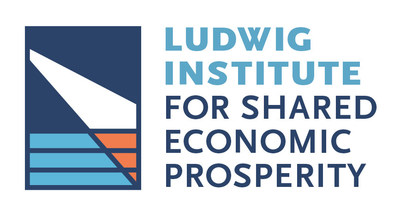Majority of Americans Can't Achieve a Minimal Quality of Life, According to New Ludwig Institute Research
Bottom 60% of nation's earners hold just 22% of disposable income but need 39% for a minimal quality of life
WASHINGTON, May 12, 2025 /PRNewswire/ -- Economic opportunity remains far out of reach for many low- and middle-income (LMI) Americans, with little to no improvement in wages or the ability to achieve a minimal quality of life for most since 2001, according to two innovative new metrics released by the Ludwig Institute for Shared Economic Prosperity (LISEP).
LISEP's Minimal Quality of Life (MQL) Index—an advanced cost-of-living measure that not only tracks essential expenses but those necessary for well-being, growth, and upward mobility—reveals that from 2001 to 2023, the cost of affording basic economic security doubled, rising 99.5%, 38% faster than the Consumer Price Index. Housing costs soared 130%, healthcare 178%, and the savings required to attend an in-state, public university 122%. Meanwhile, median earnings have declined for this group by 4% after adjusting for MQL.
"For too long, traditional cost-of-living measures have focused too much attention on mere survival. This approach ignores the fundamental truth that surviving is not living even a minimal quality of life," said LISEP Chairman Gene Ludwig. "When confronted with a measure that captures the cost of a life offering opportunity, dignity, and the ability to pursue one's potential, it becomes clear that middle- and working-class Americans aren't just being squeezed—they're being priced out of the American dream."
The Shared Economic Prosperity (SEP) Measure, a companion to the MQL, compares the income needed to achieve a minimal quality of life (as defined by the MQL) to actual income distribution, revealing a stark imbalance. In 2023, the bottom 60% of households earned just 22.1% of all disposable income but needed 39% to meet MQL. On average, these households earn $38,000 per year, falling more than $29,000 short of the MQL.
Furthermore, income growth for these households has remained sluggish, increasing at just 0.37% per year between 2001 and 2023. This contrasts sharply with the top 40%, which saw growth of 1.03% per year, and the top 5%, which experienced 1.24% annual growth.
"Traditional headline economic indicators like GDP and unemployment tell us the economy is thriving, but they don't reflect the lived reality of most Americans," Ludwig said. "Americans are working harder than ever, fueling our economic growth, but the benefits of that hard work are not being distributed in a way that supports upward mobility for too many middle- and low-income Americans"
About the MQL and SEP
The Minimal Quality of Life (MQL) Index is a comprehensive cost-of-living measure tracking the cost of economic well-being. The MQL goes beyond traditional cost-of-living measures that have been focused principally on survival by tracking both essential expenses and those necessary for well-being, growth, and upward mobility. The MQL reveals how rising costs have drastically outpaced wage growth, making economic security increasingly unattainable for many Americans. The MQL and supporting data, including white paper and methodology, are available on the LISEP website at https://www.lisep.org/mql.
LISEP's Shared Economic Prosperity (SEP) Measure gauges how national income is shared. An important adjunct to Gross Domestic Product (GDP), the SEP offers a nuanced view of economic health, analyzing not just the economy's growth but how that growth is distributed. The SEP compares the income needed to achieve a minimal quality life (as defined by LISEP's Minimal Quality of Life Index) with actual income distribution, revealing whether economic growth is translating into widespread prosperity. By tracking the gap between these figures over time, the SEP highlights how economic gains are being shared and if disparities are widening or narrowing. The SEP, supporting data, methodology and white paper are available on the LISEP website at https://www.lisep.org/sep.
About LISEP
The Ludwig Institute for Shared Economic Prosperity (LISEP) was created in 2019 by Ludwig and his wife, Dr. Carol Ludwig. The mission of LISEP is to improve the economic well-being of middle- and lower-income Americans through research and education. LISEP's original economic research includes new indicators for unemployment, earnings, and cost of living. These metrics aim to provide policymakers and the public with a more transparent view of the economic situation of all Americans, particularly low- and middle-income households, compared with misleading headline statistics. On X: @LISEP_org.
About Gene Ludwig
In addition to his role as LISEP chair, Gene Ludwig is founder of the Promontory family of companies and Canapi LLC, a financial technology venture fund. He is the founder and CEO of Ludwig Advisors, which counsels financial firms on critical matters. Ludwig is the former vice chairman and senior control officer of Bankers Trust New York Corp. and served as the U.S. Comptroller of the Currency from 1993 to 1998. He is also author of the book The Vanishing American Dream, which investigates the economic challenges facing low- and middle-income Americans. His forthcoming book, The Mismeasurement of America, will be published in September 2025 and is available for pre-order wherever books are sold. On X: @geneludwig.
![]() View original content to download multimedia:https://www.prnewswire.com/news-releases/majority-of-americans-cant-achieve-a-minimal-quality-of-life-according-to-new-ludwig-institute-research-302452666.html
View original content to download multimedia:https://www.prnewswire.com/news-releases/majority-of-americans-cant-achieve-a-minimal-quality-of-life-according-to-new-ludwig-institute-research-302452666.html
SOURCE Ludwig Institute for Shared Economic Prosperity


